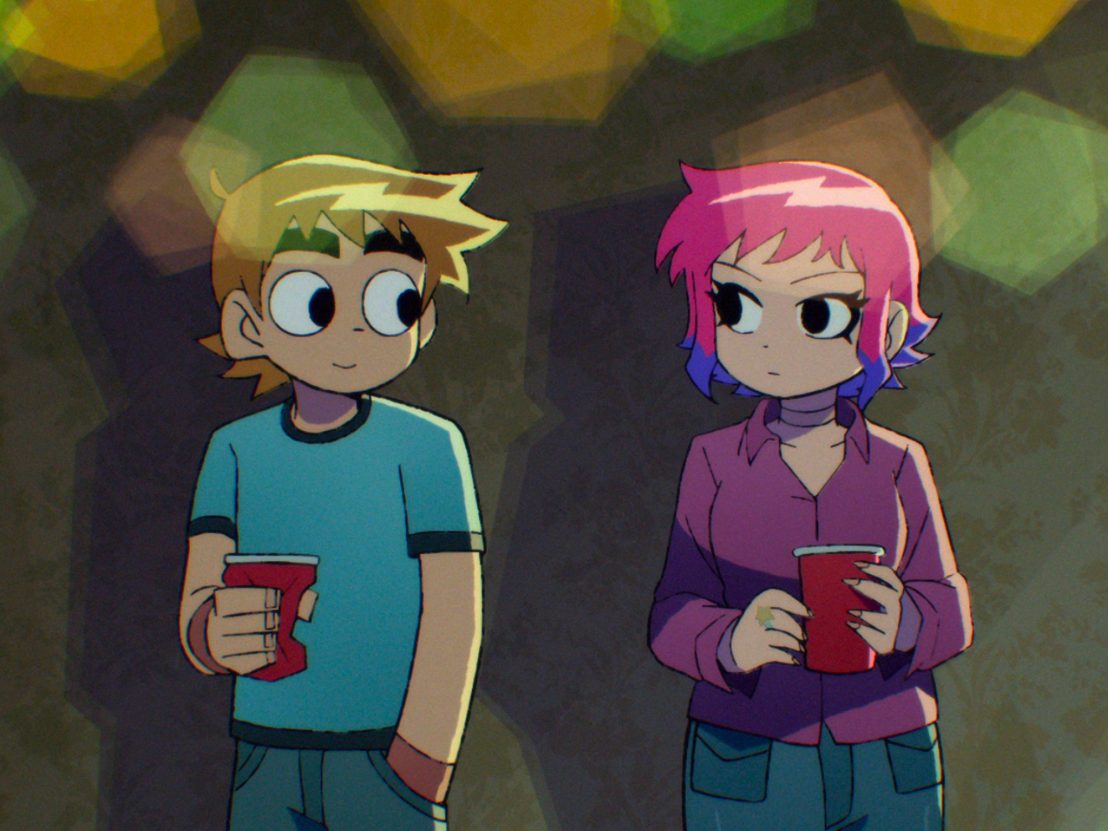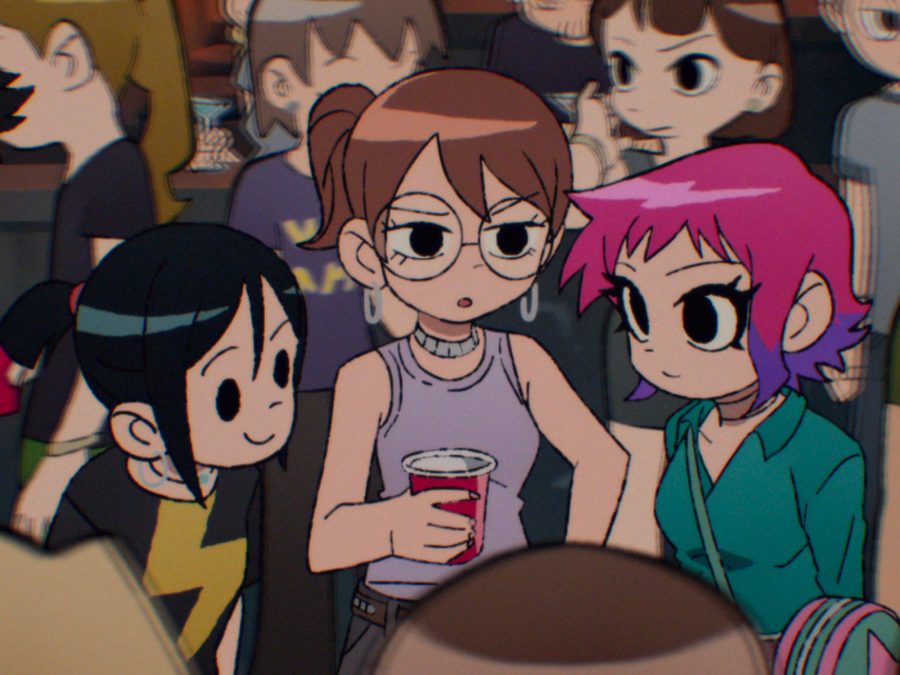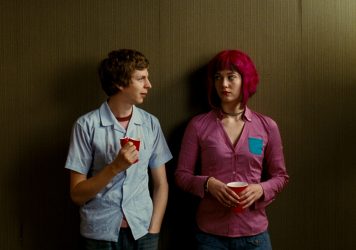
Not far into Scott Pilgrim Takes Off, Scott Pilgrim, well, takes off. In this new, looser adaptation, created and written by Bryan Lee O’Malley and BenDavid Grabinski, the title character is de-centred, leaving his supporting cast to get their own coming-of-age moments in his absence – we see their growth from their perspective and not Scott’s blinkered one. Because of this, Takes Off is less a revisitation than another reinvention of O’Malley’s popular comic book series, in conversation with both the books and the movie within its energetic, winding new story. The showrunners refuse to simply play the hits, maintaining the same slacker vibes and reference-packed rom-com-meets-battle-shonen hybrid, but in a different key this time.
Its setup as a series, the art style’s direct lift from the comics, the fact that the English dub of the anime series features the entire returning cast of Edgar Wright’s movie – this all points towards a sort of do-over that’s “more faithful” to the comics, an expansion on subplots that a feature film doesn’t have bandwidth to cover, but Scott Pilgrim Takes Off is better than that. The series pre-empts such expectations in a myriad of clever ways – the franchise has always been cute about its meta-narratives and gags but it’s played up even further here: Wright’s movie itself becomes part of the show’s conversation with and remix of Scott Pilgrim lore. That might sound too much like navel-gazing to some, but Takes Off maintains the comic’s playful spirit, never feeling self-important.
At the centre of this renewed take on O’Malley’s series is Ramona, dream girl of many a sheltered dork in the 2000s through the 2010s – here even more self-possessed and granted the same soul-searching journey that Scott Pilgrim has bumbled through twice now. It’s now more “Ramona Flowers Versus the World”, but with a gumshoe PI style, when the show isn’t trying on different genres as often as the character re-dyes her hair (in one lovely touch, each episode opens with a gorgeous sequence of her going through that process).
As she works on solving the mystery central to the season’s arc, the show unpacks the Evil Exes’ neuroses rather than simply pitting them against Scott (because Scott is gone). Ramona reflects on the compulsions that Wright’s movie only had a moment to unpack, about her own inability to grow. Even Gideon Graves takes a backseat to the rest of the exes, the two main driving forces of the movie left behind for less trodden ground, looking into different aspects of its entertaining stable of weirdos rather than the worst versions of them, as Scott saw them. That approach goes a long way to making Takes Off feel like a more mature spin on these characters: the “evil” exes still maintain their taste for the theatrical, but also go through their own moments of introspection and growth, in the absence of a simpler unifying purpose (killing Scott).
Characters who never crossed paths in the film or barely interacted in the comics have entirely new and often hilarious arcs together, while others get chances for more earnest heart-to-hearts. Some (Knives) simply get to be cooler, now they’ve stepped out of Scott’s shadow. Case in point: Roxy and Ramona, whose relationship is taken a little more seriously here.
If there’s any one problem with the series, it’s that a sizeable portion of the returning cast doesn’t always seem suited to voice acting – the energy of the English dub can often feel rather low and the rhythms of line deliveries awkward, especially when measured against the seasoned figures in its Japanese dub. But this is certainly not the case for Mae Whitman, who keeps the absurdity of her live-action performance and even finds room for pathos, as ridiculous as Roxy is. Mary Elisabeth Winstead also compels as the calm centre to the storm of the show, making for a decidedly different dynamic – a straight woman (figuratively) to all of the chaotic maniacs and egotists from her past.

But the more some things change, the more others stay the same. Takes Off may be different but it still has all the flavour of a Scott Pilgrim adaptation, fully leveraging its transmedia construction between the books, live-action and video game adaptations, an amalgamation of all of the above. It’s not only riffing on the film but bringing in elements of the cult video game, with its composer Anamanaguchi returning, accompanied by Joseph Trapanese. Sex-Bob-Omb’s songs are still scrappy but catchy, and the composers have other delightful surprises in store.
The resultant sense of spontaneity and play makes the animation producers Science Saru – their work mostly centred around the direction of former head Masaaki Yuasa – a rather ideal fit: the studio overall known for its flexible and expressive visual ethos in films like the recent Inu-Oh.
The studio’s involvement in producing the animation might be the most exciting part of this reboot. It’s helmed by Abel Góngora (whose past efforts include “T0-B1” from Star Wars Visions, the infectious opening of Keep Your Hands Off Eizouken!!), a longtime animator for the studio in his series directorial debut. Under the direction of Góngora, the show redraws the time capsule aesthetics and various homages of O’Malley’s comics. It’s not as visually out there as some of the studio’s or even just Góngora’s own efforts, but Takes Off is pleasingly cartoonish as it visually echoes the comics.
The show’s art style maintains O’Malley’s quirks, such as its costumes and cutesy character designs (via Shuhei Handa) with their squared-off fingers and blocky silhouettes, the very literal onomatopoeia (“leap”, “dash” etc). Takes Off is keenly interested in the different textures and homages that animation is uniquely equipped to undertake – like in an early Dezaki-inspired “postcard memory” shot, or throughout its incredibly kinetic action sequences. An early highlight sees a fight in a video store cross into the videos themselves, the scene evolving with the genre of each new tape – bouncing from Westerns to war movies to samurai films.
The show as a whole is steeped in Gen X cultural ephemera (Netflix video rental exists within the world of the show, winking but ominous given the company’s role in killing that business). Its throwback vibe is plastered all over its surface, the faded edges and restrained ratio of its flashbacks harkening back to 90s anime, some sequences framed like you dug out a dusty old video. In that same spirit, the show is bursting with homages and pastiches. The eagle-eyed will spot nods to Keep Your Hands Off Eizouken and Beck: Mongolian Chop Squad before the opening even finishes rolling. The series gets its own Mortal Kombat theme. Even the “anime-girl-is-late-for-school-so-she-runs-out-of-the-house-with-toast-in-her-mouth” trope makes an appearance in an extended sequence, as two characters watch anime videos in a depressed stupor. As it rewrites the story of Scott Pilgrim and Ramona, it’s the main source of nostalgia that the show allows itself.
By veering so far off the beaten path, Takes Off renews a gratifying sense of spontaneity and unpredictability that made O’Malley’s comics so fun to follow. The voice performances may not be entirely up to scratch, but those rough spots are outweighed by the show’s overall energy and sense of invention. It’s not just nostalgically circling back to the beginning like so many franchises are wont to do (a new trailer for a live-action remake of Avatar: The Last Airbender just came out). The status quo is different, the mission of the season is different, and the relationships between these characters also go through a new kind of metamorphosis as a result.
That doesn’t mean it throws everything out: O’Malley and Grabinski take the story on a new path before bringing it full circle – it was first inspired by a song by Plumtree, and so the series ends with it too. The original comics were inspired by anime and manga, and here it is as an anime series. Scott Pilgrim Takes Off gets to have it both ways, as a victory lap for a vastly beloved comic book, and as a chance for a coming-of-age series to come of age itself.
Published 17 Nov 2023

Although Scott Pilgrim is a hyperactive feast, its greatest strength is its studied literalism.

The cast of Edgar Wright's film adaptation has reunited for a Netflix miniseries about the mild-mannered, ex-dueling Torontonian.

A dancer and a musician form a unique friendship in Masaaki Yuasa's fantastical animated musical.